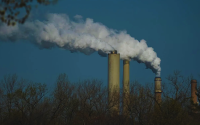8 September 2005The Independent
The Kyoto treaty's attempts to curb man-made emissions of greenhouse gases are being undermined by extra carbon dioxide released naturally from the ground as a result of climate change. A study has found that the soil of Britain is emitting more carbon dioxide into the air than a quarter of a century ago because increasing temperatures are speeding up the natural rate of organic decay.
Since 1978, Britain's soil is estimated to have released an extra 13 million tons of carbon dioxide a year, which is more than the 12.7 million tons a year saved by cleaning up industrial pollution during that period.
Scientists believe the findings have major scientific and political implications for the Kyoto treaty on climate change which is aimed at limiting the amount of man-made carbon dioxide - the major greenhouse gas - into the atmosphere.
Soil is a vast store of carbon, holding about 300 times more than the amount of carbon dioxide released through the burning of fossil fuels. Scientists thought this store was safely locked away.
It was even assumed the soil could be a major buffer or "sink" for about a quarter of the industrial emissions of carbon dioxide, but the latest findings suggest that in a warmer world the soil will actually become a new source of the greenhouse gas.
"It's a feedback loop. The warmer it gets, the faster it is happening," said Guy Kirk of the National Soil Resources Institute at Cranfield University, who led the study.
"Our findings suggest that the soil part of the equation is scarier than we thought. It means we've got 25 per cent more carbon to think about," Dr Kirk said.
The scientists analysed soil samples taken from almost 6,000 sites across England and Wales and compared the carbon content with samples taken from the same sites in 1978.
The analysis, published in the journal Nature, revealed that carbon locked up in the soil as organic material was being lost at a rate of 0.6 per cent a year - equivalent to an annual loss of 13 million tons for the entire soil of the UK.
"We think it's largely coming off as carbon dioxide, but some may be leaching away as carbon. Industrial emissions in 1990 accounted for 150 million tons a year and this is about 8 per cent of that, so it's really a very large amount," Dr Kirk said.
"The consequence is that there is more urgency about doing something. The buffering that the vegetation sink was thought to give is probably smaller than accepted," he said.
"Global warming will accelerate and the consequences of global warming will occur more rapidly."
Ian Bradley of Cranfield University, who took part in the original survey in 1978, said the loss of carbon from the soil is also likely to have an impact on agriculture. "As carbon goes down, it affects how the soil functions for us in terms of growing crops. But so far, it doesn't seem to have had a major impact on crops," Dr Bradley said.
Asked if anything can be done to ameliorate the loss, he replied: "If we were prepared to turn all of arable England back to trees, that would work - but there's no realistic possibility of that."
Detlef Schulze and Annette Freibauer of the Max-Planck Institute for Biogeochemistry in Jena, Germany, said the findings showed the scientific rationale behind the Kyoto treaty will have to be re-evaluated.






